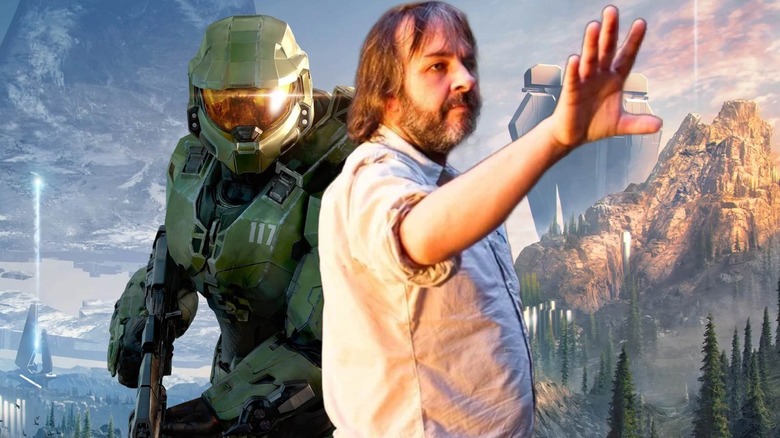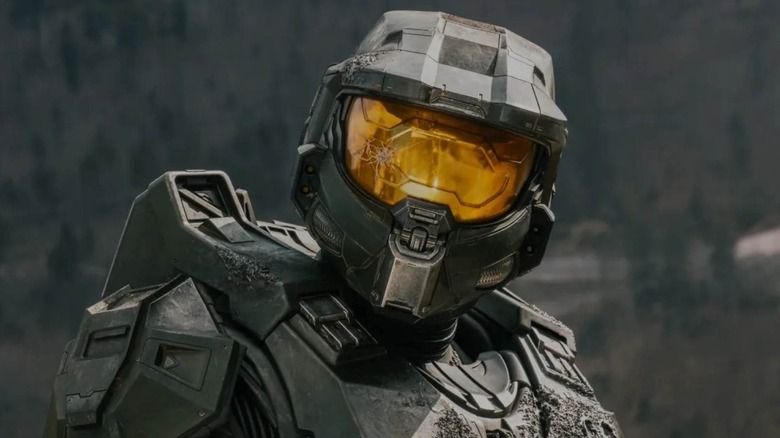Why Lord Of The Rings Director Peter Jackson Left The Halo Movie
In 2022, "Halo" fans finally got what they'd been itching to see for years when Paramount+ brought Master Chief's story to life – and they did not like the results. The biggest issue came when Pablo Schreiber as the legendary Spartan 117 did the unthinkable and removed his helmet for most of the series, seemingly trying what "The Mandalorian" had gotten away with after showing off Pedro Pascal's mug on the odd occasion. Even the show's star was unhappy with some of the creative choices that were made, which included Master Chief getting it on in the show's first season with a controversial sex scene.
Unfortunately, that and other decisions didn't hit the target correctly, and the show was canned after two seasons. But while some fans might've complained about the final short-lived project, it should've still been deemed an achievement given the numerous attempts to bring the "Halo" franchise to life before it. The most notable effort began in 2005 when "Lord of the Rings" legend, Peter Jackson, who was fresh off taming "King Kong," came aboard as director before shifting gears as executive producer and hiring Guillermo del Toro to take the chair instead.
Sadly, that team-up quickly fell apart, and instead Jackson called on the talents of up-and-coming director Neill Blomkamp to take the job. The pieces were most certainly all in place, but it wasn't long before studio interference, deals, and deadlines became so much of an issue that Jackson bailed and took his sci-fi-loving protege with him.
Master Chief was no match for financial problems
For a year, Jackson and Blomkamp were playing around in the "Halo" universe building armor, weapons and a fully functional warthog vehicle for the project via Weta Workshop. In the eyes of the studios backing the venture though, it wasn't enough. To even get the film closer to theaters, 20th Century Fox and Universal had teamed up to option the film from Microsoft in what was then the biggest buy in moviemaking history, with $5 million coming from each party. Universal would handle domestic distribution with Fox handling overseas. Both would also cough up a portion for the production budget which was reported of being somewhere on the other side of $100 million. One year later, though, both studios were unhappy with the results they were seeing.
By 2006, no final script had been given the seal of approval and yet both studios were tasked to pay 10% of the film's $100 million dollar budget to Microsoft and another portion going to Jackson as well. That was after yet another $5 million for optioning the script. Hemorrhaging money, an ultimatum was given to Jackson to either renegotiate the original terms of the deal made, or let the project collapse all together. The "Lord of the Rings" director chose not to pass or alter the initial agreement, and as a result, "Halo" was brought to an end. From there, Blomkamp and Jackson went their own way, leaving Master Chief to finish the fight however Microsoft saw fit, and the once executive producer and director to venture into a brand new district.
Neil Blomkamp blames Microsoft, not Peter Jackson for the Halo movie failing
Joining the many overhyped sci-fi movies that never saw the light, "Halo" was the project that could've broken the curse of the video game adaptation long before the likes of "The Last of Us" and "Sonic the Hedgehog" did. The silver lining is that after the parting of ways from the studios, Peter Jackson and Neil Blomkamp gave us an extra special alternative. Spawned from his head-turning short film, "Alive in Joburg," Blomkamp broke out on the scene with "District 9," showing us the vision the up-and-comer earning such high favor fans were desperate for a sequel to this original idea which we didn't get either. Looking back, though, Blomkamp argued that it was the studio and the all-powerful Microsoft that ended Master Chief's time at the movies.
Blomkamp is quoted in Jamie Russell's book "Generation X Box: How Video Games Invaded Hollywood," saying that, "When you have a corporation that potent and that large taking a percentage of the profits, then you've got Peter Jackson taking a percentage of the profits and you start adding all of that stuff up, mixed with the fact that you have two studios sharing the profits, suddenly the return on the investment starts to decline so that it becomes not worth making. Ultimately, that's essentially what killed the film." Even so, Master Chief could finally arrive in the way we hoped some day. Video game characters can often get a second life further down the line. Maybe after a disappointing movie effort and a failed show, Master Chief could get his third.


